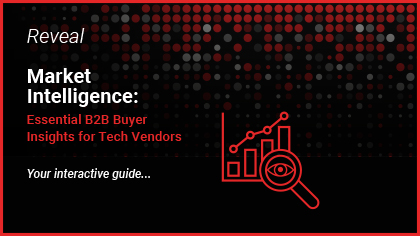Artificial Intelligence in digital marketing is a concept many B2B marketers struggle to get their heads around. However according to our latest research Full Disclosure; The B2B Content Intelligence Report, 67% of senior B2B marketers perceiving a high threat level from new market entrants leveraging AI. Such findings flag the dangers of lagging behind…
We’ve put together this informative guide to artificial intelligence (AI) including a jargon busting glossary of key concepts you’re likely to see joining the marketing vernacular.
Reading time: 5 minutes
What is artificial intelligence and how is it being used in B2B marketing?
Put simply, artificial intelligence (AI) is intelligence generated by machines which allows us to efficiently and effectively delve into all available data. AI has the ability to provide far greater amounts of more relevant data which, along with the best B2B digital marketing activities to support this, can lead to outstanding results.
A computer or robot will think and work like a human, performing tasks which normally require the natural intelligence element that they were once perceived not to hold. AI has overcome this and can provide a real competitive advantage through algorithms, machine learning, natural language processing (NLP) and it can even provide insight into the best account-based marketing lookalikes thanks to its ability to use data mining in ways you might not even have realized were possible.
The impact of AI in Digital Marketing
In the ever-evolving B2B digital marketing world, marketers are able to use AI applications for numerous B2B marketing activities such as optimizing demand generation campaigns, purchasing ads and managing buyer journey interactions. The opportunities are endless; machine intelligence extends our capabilities to deliver seamless content experiences by providing the potential for personalized content creation across multiple channels while simultaneously gathering a greater understanding of target audience segments.
Marketers are therefore freed up, giving them more time to focus their creative skills on seeing B2B digital marketing reach new levels.
AI Threat Level
As previously mentioned, two thirds of senior B2B marketers perceive a high threat level from new market entrants who use emerging AI to identify and apply better intelligence to gain competitive advantage. This is according to our research published in our latest Full Disclosure; The B2B Content Intelligence Report. Interestingly, only 4% felt that this posed a low risk. These stats alone reveal a clear emphasis on the importance of AI for digital marketers going forward, while highlighting the disadvantaged position of those currently not utilizing it.
To help you master the world of AI, here’s a list of the most common key terms, concepts and acronyms that you’ll likely come across with increasing frequency, as more businesses integrate AI elements into their B2B marketing strategies…
Algorithms – a list of rules or instructions that must be followed in the right sequence in order to solve a problem. They are given to intelligence machines to help them learn on their own; clustering, classification, regression, and recommendation being the four most popular types.
Artificial Intelligence (AI) – the ability of a machine, computer, or robot to perform tasks and make decisions that require and stimulate human intelligence, behavior and discernment.
Artificial Neural Network (ANN) – brain-inspired learning systems created to replicate the way humans learn, with the ability to solve tasks which are too complex for traditional computer systems to understand.
Augmented Reality – an interactive and enhanced experience of the real physical world through superimposing objects, sounds or other sensory stimuli into it via technology.
Big Data – extremely large, complex or fast sets of both structured and unstructured data, that are consequently impossible to process in traditional ways. Computational analysis and mining can reveal key trends, patterns, and information for machine learning.
Chatbots – a computer program purposely created to simulate a conversation with human users through text-to-speech and on-line chat or voice commands, aiming to replicate an actual human conversation.
Classification – enables machines to identify and assign a category to a new data point based on the training dataset which contains data points and their corresponding labels.
Cloud Computing – using a network of internet hosted remote servers to manage, store and process data whenever, wherever.
Cluster analysis – an unsupervised machine learning task used to interpret and analyze data to find similarities for natural groupings or clusters.
Clustering – machines will divide data points into groups with similar characteristics.
Convolutional Neural Network (CNN) – a type of artificial neural network used to identify and make sense of imagery.
Data Mining – analyzing and drilling down into large data sets to discover patterns and gain new information and data.
Data Warehouse – a type of data management system used to perform analysis and queries on large volumes of historical data.
Decision Tree – a tree-like structured model, used to visually map out decisions and their potential outcomes.
Deep Learning – machines autonomously replicate the human brain thought patterns through artificial neural networks made up of vast layers of information.
Genetic Algorithm – an algorithm based on natural selection and genetics, used to search for optimal and near-optimal solutions to solve highly complex problems.
Logic Programming – a programming paradigm written in a logic programming language to express knowledge based rules and facts about specific problems or areas.
Machine Intelligence – an umbrella term encompassing deep learning, machine learning and classical algorithm output.
Machine Learning – a focus on computer algorithms which allow machines to improve and learn automatically through experience and data rather than needing to be programmed to do so.
Machine Perception – the ability for a computer system to interpret and receive data in a way which is similar to how humans use their senses to do the same, typically using attached hardware.
Natural Language Processing – the capability of a computer program to recognize, process and analyze human communication i.e. natural language data, how it is intended to be understood
Python – an interpreted language which is simplistic, concise and with a readable code, eliminating the need for it to be composed into machine language before the developer can run the program.
Recurrent Neural Network (RNN) – a type of neural network which makes sense of and recognizes patterns in sequential data, and then creates results and outputs accordingly.
Supervised Learning – a form of machine learning which uses labelled datasets to train a machine into generating desired algorithms based on learning to match a specific input to a specific output.
Swarm Behavior – the collective behavioral output of individuals following simple rules in a decentralized manner, often interacting with limited intelligence.
Unsupervised Learning – a type of machine learning algorithm which learns patterns from unlabeled input data, in the hope that this will in effect teach it to produce imaginative outputs.
As you can tell, AI is ever evolving and so is its pivotal role in helping B2B marketers achieve their marketing objectives. While it is seen as a threat to businesses not currently executing it, AI has the proven ability to increase a company’s available reach to gain a true competitive advantage.
To find out how you can implement any of these concepts into your own campaigns, check out our ABM List Generator – let us use our AI capabilities to supercharge your digital campaigns with a list of high priority lookalikes. Perfect if you’re looking to increase your available reach to enhance your current ABM strategy.









